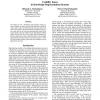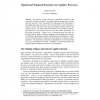266 search results - page 20 / 54 » Identifying Objects Over Time with Description Logics |
AAAI
1998
13 years 10 months ago
1998
The amount of use a knowledge representation system receives depends on more than just the theoretical suitability of the system. Some critical determiners of usage have to do wit...
BIRTHDAY
1997
Springer
14 years 1 months ago
1997
Springer
The structures of space and time are identified as essential for the realization of cognitive systems. It is suggested that the omnipresence of space and time may have been respons...
ICLP
2005
Springer
14 years 2 months ago
2005
Springer
This paper presents experimental comparisons between declarative encodings of various computationally hard problems in both Answer Set Programming (ASP) and Constraint Logic Progra...
AGP
1994
IEEE
14 years 1 months ago
1994
IEEE
Kowalski and Sergot's Event Calculus (EC) is a formalism for reasoning about time and change in a logic programming framework. From a description of events which occur in the...
CORR
2008
Springer
13 years 9 months ago
2008
Springer
Multi-relational networks are used extensively to structure knowledge. Perhaps the most popular instance, due to the widespread adoption of the Semantic Web, is the Resource Descr...


